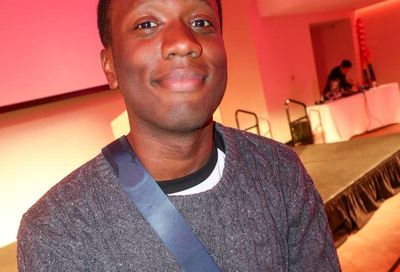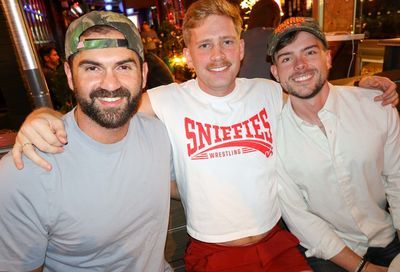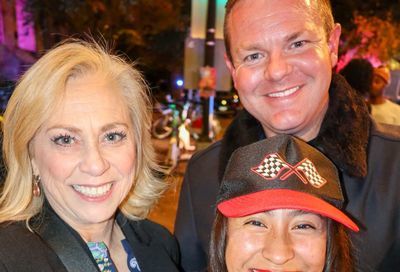Maryland House Committees Host Joint Marathon Hearing on Marriage Equality
[Photo: The scene at the Maryland House of Delegates joint committee hearing on Feb. 10, 2012. (Photo by John Riley.)]
Like Rocky Balboa, marriage equality is back for another round of fighting.
Supporters and opponents of a bill legalizing same-sex nuptials clashed once more at a joint hearing of the House Judiciary and Health and Government Operations committees on Friday, Feb. 10, as the lower chamber considered the bill.
A similar bill passed the Maryland Senate in 2011 by a vote of 25-21, but was sent back to committee after supporters failed to gain the votes necessary for passage in the House of Delegates.
Friday’s hearing featured many familiar faces, as many of the witnesses had previously testified at a similar hearing held by the Senate Judicial Proceedings Committee on Jan. 31. The committee members at Friday’s hearings also were not strangers to those on both sides of the issue.
Some of the committee members — Delegates Tiffany Alston (D-Prince George’s Co.), Jill Carter (D-Baltimore City) and Del. Sam Arora (D-Montgomery Co.) — made headlines last year when they wavered on their support for the measure under pressure and intense lobbying by opponents of marriage equality. Carter eventually voted for the bill in committee. Several other members of the two committees have either been vocal advocates of the bill, such as Delegates Joseline Peña-Melnyk (D-Anne Arundel, Prince George’s counties) and Keiffer Mitchell, Jr. (D-Baltimore City) or opponents of the bill, such as Del. Don Dwyer (R-Anne Arundel Co.) and Neil Parrott (R-Washington Co.).
The hearing kicked off with testimony from O’Malley and two ministers, Rev. Delman Coates and Rev. Donte Hickman, who spoke in favor of marriage equality.
Coates told members of the two committees that people’s personal beliefs and religious views on homosexuality should not be a factor influencing whether gay and lesbian couples get equal recognition under the law.
“Public policy has never been predicated on public consensus or personal preferences,” Coates said.
Coates also went further, saying that adultery, divorce, out-of-wedlock children and abortion, also are violations of the tenets of some religions.
“If gays and lesbians are denied for this reason, why are heterosexuals who engage in adultery, divorce, having children outside of marriage and abortion not denied?” he asked.
But Mary Ellen Russell, spokeswoman for the Maryland Catholic Conference, took issue with Coates’s testimony, arguing that people’s faith cannot be considered independent from the law, as it informs their views and perceptions of an issue.
“We’re not talking about a simple matter of belief,” Russell said. “We can’t get around this issue.”
Russell said that if the legislature was concerned about rights and protections for same-sex couples and their children, then they should find another way under the law without redefining marriage. She also indirectly slammed Democratic lawmakers, unions and other LGBT allies for applying “undue pressure” to lawmakers, and begged members of the committees to “let this be a vote of conscience.”
The hearing also contained several heated back-and-forth exchanges between legislators from either side of the issue and witnesses.
When Russell and Pastor Derek McCoy of the Maryland Marriage Alliance were testifying, Del. Luiz Simmons (D-Montgomery Co.) pounced on their statements, saying, “I feel you have turned the idea of American pluralism on its head. You want us to accept your views, yet you want to impose your will on others who don’t believe the same.”
Simmons also hammered Russell and McCoy on the distinction between procreating and raising children, asking them why they believed procreation, or the ability to do so biologically, was more important to marriage than actually raising children, as many gay and lesbian couples are.
McCoy then commented that Simmons’s question was very long, prompting Simmons to snap back, “Almost as long as your statement.”
Del. Kirill Reznik (D-Montgomery Co.) was less reserved, peppering McCoy with questions about the other factors leading to the breakdown of marriage, and asked why McCoy had failed to testify when the General Assembly passed legislation that made it easier for couples to divorce, or when it passed legislation on domestic violence, which also contributes to the breakdown of marriages. As McCoy tried to respond, Reznik continued, asking if McCoy would support outlawing divorce, or requiring proof of fertility before a heterosexual couple can marry.
When Del. Dwyer, who testified along Del. Emmett Burns (D-Baltimore County), spoke in opposition to the bill, he showed the panel a short movie in which a man claimed to have been arrested for objecting to his child being taught about homosexuality in school. Dwyer claimed that same-sex marriage would be taught to schoolchildren as normal, and claimed it already is in several Maryland counties.
Dwyer said he wanted to amend the bill he is sponsoring, HB 474, to read: “Only marriage between a man and a woman shall be valid in this state.” Dwyer said he wanted to put the measure on the ballot for an up-or-down vote by the citizenry of Maryland.
In response to Dwyer’s testimony, out lesbian Del. Bonnie Cullison (D-Montgomery Co.) asked Dwyer if he agreed that the bill does not mandate curriculum for schools. When Dwyer didn’t respond affirmatively or negatively, Cullison followed up, asking him if he knew how school curriculum is formed, prompting Dwyer to respond: “I don’t study education or curriculum.”
Cullison responded that she does, and that school curriculum is determined by local school boards and administrators and is very carefully crafted, unlike what Dwyer was claiming.
But opponents on the committees were not without their own one-liners.
When sister and brother team Laura and Billy Murphy of Baltimore testified in favor of the bill, Parrott asked them if they agreed that the bill redefined marriage. When they started to object to that classification, Parrott cut them off, saying yes it was. He also said that sexual orientation was a choice and not something a person was born with, prompting Billy Murphy to object, saying there is no scientific evidence to prove that. Parrott said that there was no evidence to disprove it, either.
When it was her turn to question opponents of the bill, Alston asked witnesses to explain some of the legal problems that had been faced by religious people and organizations in states or places like the District of Columbia, where same-sex marriage was legalized.
Alston also asked whether it would be all right to provide protections for same-sex couples without calling it marriage, reinforcing her actions last year when she switched from supporting marriage equality to recommending that the Assembly change last year’s marriage bill to grant “civil unions” instead.
As of 8 p.m. Friday, the committees were still calling witnesses from both sides to testify.
Support Metro Weekly’s Journalism
These are challenging times for news organizations. And yet it’s crucial we stay active and provide vital resources and information to both our local readers and the world. So won’t you please take a moment and consider supporting Metro Weekly with a membership? For as little as $5 a month, you can help ensure Metro Weekly magazine and MetroWeekly.com remain free, viable resources as we provide the best, most diverse, culturally-resonant LGBTQ coverage in both the D.C. region and around the world. Memberships come with exclusive perks and discounts, your own personal digital delivery of each week’s magazine (and an archive), access to our Member's Lounge when it launches this fall, and exclusive members-only items like Metro Weekly Membership Mugs and Tote Bags! Check out all our membership levels here and please join us today!






















